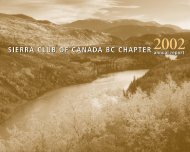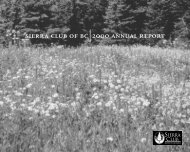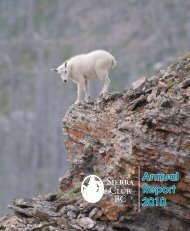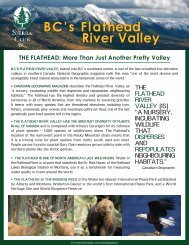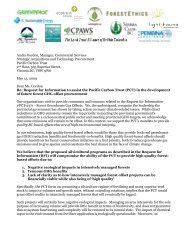Bogus Business? Bottling Bute - Sierra Club BC
Bogus Business? Bottling Bute - Sierra Club BC
Bogus Business? Bottling Bute - Sierra Club BC
You also want an ePaper? Increase the reach of your titles
YUMPU automatically turns print PDFs into web optimized ePapers that Google loves.
WATER<br />
<strong>Bute</strong> continued<br />
Environmental Assessment<br />
Notices posted in local newspapers<br />
in December about the most<br />
recent of these applications triggered<br />
action by five groups – Friends of<br />
<strong>Bute</strong> Inlet, Campbell River chapter of<br />
the Council of Canadians, <strong>Sierra</strong> <strong>Club</strong><br />
Quadra Island, <strong>Sierra</strong> <strong>Club</strong> Malaspina,<br />
and the Sunshine Coast Conservation<br />
Association.<br />
They appealed to Murray Coell,<br />
<strong>BC</strong>’s Minister of Environment, to designate<br />
all of these related water and<br />
land applications as a single reviewable<br />
project under the Environmental<br />
Assessment Act, arguing that the full<br />
scope and impacts of the project will<br />
not be assessed by any other process.<br />
The application-by-application<br />
permit-stamping modus operandi of<br />
the MNRO is not appropriate for a<br />
scheme of this complexity.<br />
The four inlets in question are<br />
already subject to some of <strong>BC</strong>’s largest<br />
run-of-river power generation<br />
proposals, notably those in Toba Inlet<br />
and <strong>Bute</strong> Inlet by Plutonic Power<br />
Corp. and General Electric. Licences<br />
to remove water from 34 to 40 or<br />
more streams in those same inlets will<br />
exacerbate environmental impacts.<br />
When is enough What are the cumulative<br />
impacts of all these projects,<br />
ecologically, socially, economically<br />
Reviewing the situation, Andrew<br />
Gage of West Coast Environmental<br />
Law concluded that MNRO must at<br />
least extend the public comment period<br />
on all the applications and order<br />
the proponent to provide a description<br />
of the entire project. In his letter<br />
to MNRO, Gage said, “The optics of<br />
breaking up the project in this way,<br />
and inviting public comment on only<br />
individual pieces of the project in isolation,<br />
does not encourage public confidence.”<br />
As of press time, neither West<br />
Coast Environmental Law nor the local<br />
groups had received replies from<br />
anyone in government.<br />
Snowcap, Sun Belt and the one that got away<br />
<strong>BC</strong> doesn’t allow bulk water exports,<br />
with one exception. A grandfathered licence<br />
allows 246,696 m 3 /year to be withdrawn<br />
from Alpine Creek in Toba Inlet.<br />
This licence belongs to Alpine Glacier<br />
Water Inc., and the water is sold as 10<br />
Thousand <strong>BC</strong>. In the fiscal year ending<br />
April 1, 2010, the company took 18,927<br />
m3, about eight per cent of its permitted<br />
volume. The company wouldn’t speak<br />
to us, so we don’t know if the water is<br />
trucked to Kelowna for bottling or is<br />
barged out of <strong>BC</strong>.<br />
How the export ban came about is by<br />
now the stuff of stories. Goleta County<br />
in southern California was in the midst<br />
of a drought and in 1991 requested bids<br />
for alternative sources of supply. Sun Belt<br />
Waters of California was the successful<br />
bidder, intending to import water from<br />
Toba Inlet under a licence applied for by<br />
Snowcap Waters of Fanny Bay. Another<br />
Canadian company, Western Canadian<br />
Waters (WCW), won the bid, offering<br />
water from an existing licence near Ocean Falls. Four days after Goleta<br />
County made its decision, the <strong>BC</strong> government issued Order in Council 331<br />
slapping a moratorium on all export applications, including Snowcap’s. The<br />
moratorium has since become a legislated ban on new export licences.<br />
Sun Belt and Snowcap sued the <strong>BC</strong> Government, claiming the export<br />
ban was to ensure WCW got the Goleta County contract. The <strong>BC</strong> government<br />
eventually paid Snowcap $335,000 in an out-of-court settlement. Sun<br />
Belt, however, got nowhere with its claims against the <strong>BC</strong> government for<br />
some $700 million in damages, so it jacked it up to $15.75 billion and has<br />
charged the Canadian government under NAFTA. The case has a distinct<br />
smell of wing-nuttery about it – Sun Belt’s website is the best source – and<br />
includes charges of an inappropriate relationship between WCW and the<br />
government of Bill Vander Zalm. Still, David Boyd places it somewhere<br />
between “a good arguable case” and “ludicrous.”<br />
As for Goleta County, it rained, filled the county’s reservoirs, and extinguished<br />
the <strong>BC</strong> export schemes before any deals were consummated.<br />
Proposed revisions to <strong>BC</strong>’s Water<br />
Act have suggested a future for “Water<br />
Markets” and permit trading. How<br />
might the unused capacity in all these<br />
licences be used in these water markets<br />
Is this a setup for a bulk export<br />
of water from <strong>BC</strong><br />
Is bottling a use of water which<br />
the <strong>BC</strong> government should be encouraging<br />
Or should the province follow<br />
the example of a growing number of<br />
local governments not just in Canada,<br />
but around the world, and discourage<br />
the mass spread of bottled water<br />
t<br />
Arthur Caldicott is an energy researcher<br />
and a frequent contributor to<br />
the Watershed Sentinel.<br />
Watershed Sentinel 28<br />
March-April 2011



